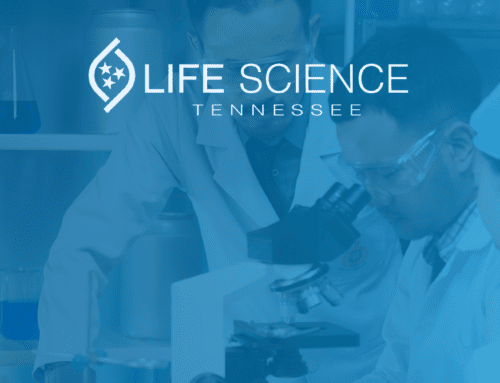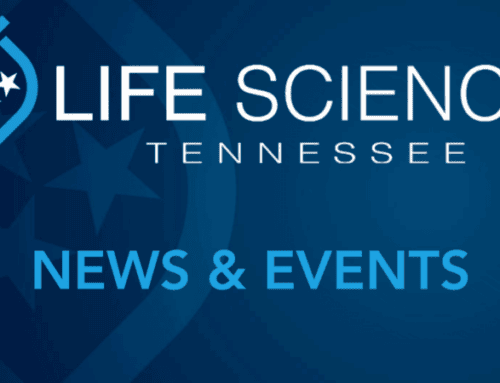Since last week, multiple cities in Tennessee have issued “safer at home” orders that urge the closure of non-essential businesses, including Memphis/Shelby County, Nashville/Davidson County, Knox County and Chattanooga. Meanwhile, the federal government is working to pass another response package that includes stimulus funds for business, as well as several initiatives to support the rapid development and deployment of treatments and medical supplies.
Below, we’ve highlighted useful information and more of what our members are doing to limit the spread of COVID-19. Please email Sara Pruneski if your company is working on innovative approaches or if you have a need for research or supplies so that we can connect you to a member.
Needed Medical Supplies & Reagents
Vanderbilt University Medical Center is in need of molecular biology reagents and other testing supplies. If you are able to donate any reagents, please email Matt Scanlan and he will arrange pickup (from anywhere in the state).
Also, in response to a critical shortage of medical and personal protective equipment (PPE), the city of Nashville’s Office of Emergency Management (OEM) has announced an emergency supply drive. The OEM is specifically requesting donations of items including surgical face masks & N95 mask, sani-cloth wipes, red top viral tubes, and nasal swabs among other items.
If any members are able to donate unused or new supplies, please email OEM at [email protected] or complete the donations form here. Big thanks to LST annual sponsor and member Waller who saw the request earlier and donated needed hand sanitizer!
Cumberland Pharma Launches National Initiative
Cumberland Pharmaceuticals this week launched a national initiative to support the treatment of patients with hospital-acquired and ventilator-associated pneumonia associated with the outbreak of the coronavirus.
The initiative is designed to help address potential antibiotic shortages and includes:
- Cumberland is offering special financial arrangements for hospitals and clinics, including extended payment terms, for all direct account purchases of its VIBATIV antibiotic, designed to treat serious infections and other Gram-positive bacteria.
- The launch of a national program with infectious disease experts. The program will provide information on the management of complicated respiratory infections resulting from the coronavirus.
UTHSC Goes All in on COVID-19 Response
The University of Tennessee Health Science Center (UTHSC) is leveraging its resources in a number of ways to respond to the COVID-19 pandemic. As reported last week, Dr. Colleen Jonsson and the faculty and staff of the Regional Biocontainment Laboratory (RBL) are working around the clock with the scientists of the Oak Ridge National Laboratory (ORNL) to develop and test novel antiviral compounds to aid in the fight against COVID-19. Hear more about that work and ORNL’s supercomputer on NPR.
Others at UTHSC have created innovations around testing. Drs. Scott Strome, Jon McCullers, and David Schwartz envisioned the drive-thru COVID-19 testing facility on Tiger Lane that was then staffed by UTHSC students. Meanwhile, Drs. Mahul Amin, Neil Hayes, and their faculty and staff set up a high throughput COVID-19 testing facility with University Clinical Health in the Department of Pathology.
The Dentistry faculty and staff turned their 3D dental printer into a mechanism for making N95 masks and face shields. Additionally, they opened the Dunn Dental Building to treat dental emergencies to keep these patients from needing to go the emergency room.
Lastly, the faculty and staff of the Plough Center for Sterile Drug Delivery Solutions are now set up to manufacture essential medical sterilants and antiseptics.
Vanderbilt Vaccine Center Develops Toolkit
Researchers from the Vanderbilt Vaccine Center (VVC) have rapidly responded to the COVID-19 outbreak by building a comprehensive “toolkit” to identify and analyze antibodies isolated from the blood of survivors for their ability to neutralize SARS-CoV-2, the virus that causes COVID-19. The research focuses on clones of white blood cells producing antibodies that target specific viral proteins. Previously, this strategy has been used to combat viruses like Ebola, Zika, HIV, and norovirus.
“We have ultra-rapid antibody discovery technologies and already have discovered SARS-CoV-2 antibodies,” said Dr. James Crowe, director of the VVC. The goal is to develop and manufacture the most promising lead antibodies for human clinical trials by the summer, according to Dr. Crowe.
Resources at VUMC that enable the researchers to map antibody sequences and antibody specificities include the Medical Center’s core genomics laboratory, Vanderbilt Technologies for Advanced Genomics (VANTAGE).
BARDA Hub for Research Opportunities
The Biomedical Advanced Research and Development Authority (BARDA) launched a hub where they are carefully reviewing all research opportunities that are submitted on it. You can request a meeting if you are working on a vaccine, diagnostic, therapeutic, or offering some other service or product. Access the hub at www.medicalcountermeasures.gov.
Johnson & Johnson Vaccine Development
Johnson & Johnson has rapidly engaged in a multipronged response to the coronavirus outbreak. They initiated efforts to develop a vaccine against the virus in early January 2020, when the viral sequence became publicly available. The company’s vaccine program leverages the Janssen AdVac® and PER.C6® technologies that provide the ability to rapidly upscale production of the optimal vaccine candidate. These are the same technologies that were used in the development and manufacturing of J&Js investigational Ebola vaccine, which is currently deployed in the Democratic Republic of the Congo (DRC) and Rwanda, and were also used to construct our Zika, RSV, and HIV vaccine candidates.
FDA Issues Guidance for Ongoing Clinical Trials During COVID-19 Pandemic
Last week, the FDA issued a guidance document titled, “FDA Guidance on Conduct of Clinical Trials of Medical Products during the COVID-19 Pandemic” (the “Guidance”). Their stated purpose in issuing the guidance is to help sponsors to assure the safety of trial participants, maintain compliance with good clinical practice (“GCP”), and minimize risk to the integrity of trials during the ongoing COVID-19 pandemic.
The Guidance does not establish new legally enforceable responsibilities. However, LST board member Julie Lampley at Epstein Becker Green identified key takeaways and recommended action items for sponsors and research institutions. Read those here.
Other important updates and resources:
- The U.S. Small Business Administration has put together this helpful resource guide, including on how to apply for the Economic Injury Disaster Loan Program.
- BIO launched the Cornoavirus Hub to connect companies and organizations that have relevant supplies, capacities, and resources to share with companies, researchers, or healthcare providers in need of those items.
- PhRMA and BIO released a commitment to finding solutions to prevent, diagnose, and treat those with COVID-19
- See this guide to coronavirus drugs and vaccines in development, put together by Stat News.
- Hear how Medtronic is ramping up production of ventilators to meet the growing demand.
- Watch this interview with Pediatrician-in-Chief at Le Bonheur and Senior Associate Dean of UT Medical School Jon McCullers and Pediatric-Infectious Disease Specialist Nicholas Hysmith as they discuss COVID-19.



